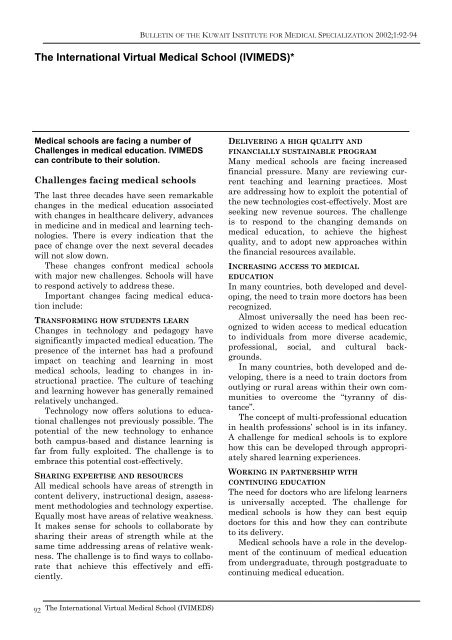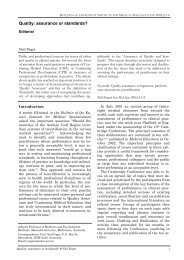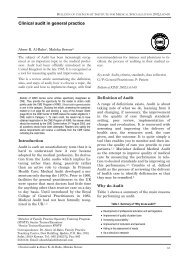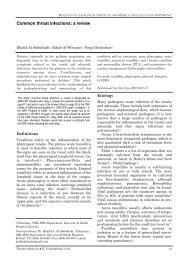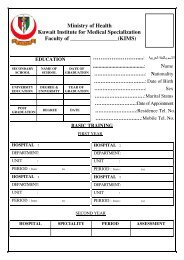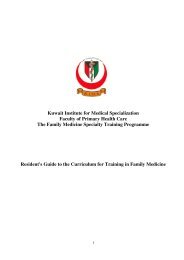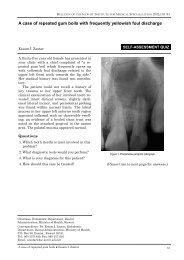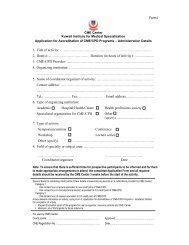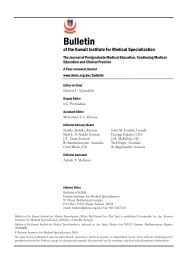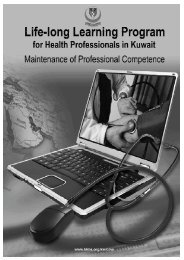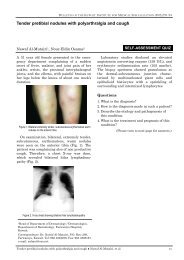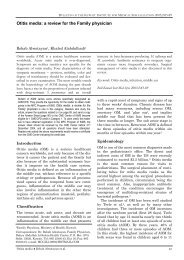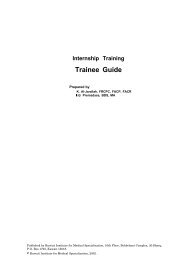The International Virtual Medical School (IVIMEDS)* - KIMS
The International Virtual Medical School (IVIMEDS)* - KIMS
The International Virtual Medical School (IVIMEDS)* - KIMS
You also want an ePaper? Increase the reach of your titles
YUMPU automatically turns print PDFs into web optimized ePapers that Google loves.
BULLETIN OF THE KUWAIT INSTITUTE FOR MEDICAL SPECIALIZATION 2002;1:92-94<br />
<strong>The</strong> <strong>International</strong> <strong>Virtual</strong> <strong>Medical</strong> <strong>School</strong> (<strong>IVIMEDS</strong>)*<br />
<strong>Medical</strong> schools are facing a number of<br />
Challenges in medical education. <strong>IVIMEDS</strong><br />
can contribute to their solution.<br />
Challenges facing medical schools<br />
<strong>The</strong> last three decades have seen remarkable<br />
changes in the medical education associated<br />
with changes in healthcare delivery, advances<br />
in medicine and in medical and learning technologies.<br />
<strong>The</strong>re is every indication that the<br />
pace of change over the next several decades<br />
will not slow down.<br />
<strong>The</strong>se changes confront medical schools<br />
with major new challenges. <strong>School</strong>s will have<br />
to respond actively to address these.<br />
Important changes facing medical education<br />
include:<br />
TRANSFORMING HOW STUDENTS LEARN<br />
Changes in technology and pedagogy have<br />
significantly impacted medical education. <strong>The</strong><br />
presence of the internet has had a profound<br />
impact on teaching and learning in most<br />
medical schools, leading to changes in instructional<br />
practice. <strong>The</strong> culture of teaching<br />
and learning however has generally remained<br />
relatively unchanged.<br />
Technology now offers solutions to educational<br />
challenges not previously possible. <strong>The</strong><br />
potential of the new technology to enhance<br />
both campus-based and distance learning is<br />
far from fully exploited. <strong>The</strong> challenge is to<br />
embrace this potential cost-effectively.<br />
SHARING EXPERTISE AND RESOURCES<br />
All medical schools have areas of strength in<br />
content delivery, instructional design, assessment<br />
methodologies and technology expertise.<br />
Equally most have areas of relative weakness.<br />
It makes sense for schools to collaborate by<br />
sharing their areas of strength while at the<br />
same time addressing areas of relative weakness.<br />
<strong>The</strong> challenge is to find ways to collaborate<br />
that achieve this effectively and efficiently.<br />
DELIVERING A HIGH QUALITY AND<br />
FINANCIALLY SUSTAINABLE PROGRAM<br />
Many medical schools are facing increased<br />
financial pressure. Many are reviewing current<br />
teaching and learning practices. Most<br />
are addressing how to exploit the potential of<br />
the new technologies cost-effectively. Most are<br />
seeking new revenue sources. <strong>The</strong> challenge<br />
is to respond to the changing demands on<br />
medical education, to achieve the highest<br />
quality, and to adopt new approaches within<br />
the financial resources available.<br />
INCREASING ACCESS TO MEDICAL<br />
EDUCATION<br />
In many countries, both developed and developing,<br />
the need to train more doctors has been<br />
recognized.<br />
Almost universally the need has been recognized<br />
to widen access to medical education<br />
to individuals from more diverse academic,<br />
professional, social, and cultural backgrounds.<br />
In many countries, both developed and developing,<br />
there is a need to train doctors from<br />
outlying or rural areas within their own communities<br />
to overcome the “tyranny of distance”.<br />
<strong>The</strong> concept of multi-professional education<br />
in health professions’ school is in its infancy.<br />
A challenge for medical schools is to explore<br />
how this can be developed through appropriately<br />
shared learning experiences.<br />
WORKING IN PARTNERSHIP WITH<br />
CONTINUING EDUCATION<br />
<strong>The</strong> need for doctors who are lifelong learners<br />
is universally accepted. <strong>The</strong> challenge for<br />
medical schools is how they can best equip<br />
doctors for this and how they can contribute<br />
to its delivery.<br />
<strong>Medical</strong> schools have a role in the development<br />
of the continuum of medical education<br />
from undergraduate, through postgraduate to<br />
continuing medical education.<br />
92<br />
<strong>The</strong> <strong>International</strong> <strong>Virtual</strong> <strong>Medical</strong> <strong>School</strong> (<strong>IVIMEDS</strong>)
BULLETIN OF THE KUWAIT INSTITUTE FOR MEDICAL SPECIALIZATION 2002;1:92-94<br />
PROVIDING LEADERSHIP IN MEDICAL<br />
EDUCATION<br />
<strong>Medical</strong> schools have an important leadership<br />
role to play in steering and directing changes<br />
in medical education relating to curriculum<br />
delivery, educational strategies, instructional<br />
design, teaching and learning methods, assessment,<br />
globalization and international<br />
standard setting.<br />
<strong>The</strong> <strong>IVIMEDS</strong> collaboration<br />
THE AIMS OF <strong>IVIMEDS</strong><br />
<strong>The</strong> <strong>International</strong> <strong>Virtual</strong> <strong>Medical</strong> <strong>School</strong><br />
(<strong>IVIMEDS</strong>) is a unique collaboration among<br />
leading edge medical schools and institutions<br />
world-wide committed to achieving maximum<br />
benefit from new educational technologies.<br />
<strong>IVIMEDS</strong>, working where appropriate with<br />
other professions, aims to play a part in improving<br />
health and tackling human disease<br />
worldwide by providing a blend of e-learning<br />
and high quality face-to-face learning for<br />
medical professionals.<br />
DEVELOPING THE CONCEPT<br />
Over the past year, a study of the <strong>IVIMEDS</strong><br />
concept has been undertaken, funded by the<br />
Scottish Higher Education Funding Council,<br />
Scottish Enterprise, Scottish knowledge and<br />
NHS Education for Scotland. Discussions<br />
were held with 52 collaborating medical<br />
schools and institutions from 16 countries.<br />
One hundred and eight representatives met<br />
in St. Andrews from the 12 th - 14 th June 2002,<br />
to review the proposal.<br />
<strong>The</strong> June meeting was the culmination of<br />
Stage 1 of a three-stage development of<br />
<strong>IVIMEDS</strong>. Stage 2 is a full feasibility study<br />
and proof of concept for <strong>IVIMEDS</strong> that will<br />
take a year to complete. Stage 3 would be the<br />
full implementation of the business plan developed<br />
during Stage 2.<br />
<strong>The</strong> <strong>IVIMEDS</strong> concept was endorsed at the<br />
June meeting and it was concluded that medical<br />
schools and institutions should be invited<br />
to participate in Stage 2 of the development.<br />
FEATURES OF <strong>IVIMEDS</strong><br />
<strong>IVIMEDS</strong> will include:<br />
• A bank of shareable learning resource materials<br />
in the form of reusable learning objects<br />
(RLOs). RLOs are small discrete<br />
chunks of learning that are metatagged<br />
(indexed) and stored in a database. Interna-<br />
tional standards for metatagging will be<br />
used to insure maximum interoperability.<br />
<strong>The</strong> RLOs may be pieces of text, short video<br />
clips, annotated diagrams, simulated problems<br />
or questions. <strong>The</strong>y can be used in a<br />
wide range of learning situations in different<br />
instructional contexts.<br />
• Curriculum maps that assist students and<br />
instructors to exchange information about<br />
what is being taught and when it is taught.<br />
<strong>The</strong>y help to ensure that the curriculum<br />
reflects the overall goals of the individual<br />
partner schools.<br />
• Student study guides in the form of personal<br />
learning plans that will help the student<br />
follow their optimal path through the<br />
curriculum. <strong>The</strong> study guides may vary depending<br />
on a student’s background, prior<br />
experience, learning style and plan for completing<br />
the curriculum<br />
• Appropriate face-to-face learning experiences<br />
blended with the e-learning opportunities<br />
and provided in a partner school, in<br />
the community or elsewhere.<br />
• Student support provided through face-toface<br />
and/or online faculty mentors, student<br />
study guides and peer-to-peer collaborative<br />
learning experiences using software developed<br />
for the purpose.<br />
• State of art assessment methods that serve<br />
both a formative and summative role in the<br />
evaluation of students. Assessments will<br />
reflect the learning outcomes agreed by<br />
partner schools and will be developed in<br />
collaboration with partner schools and with<br />
national testing bodies.<br />
• Development and maintenance of quality.<br />
<strong>The</strong> <strong>IVIMEDS</strong> program will be structured<br />
to take full account of international academic<br />
and technology standards. It will embrace<br />
appropriate quality assurance measures<br />
and best evidence medical education.<br />
DEVELOPMENT OF <strong>IVIMEDS</strong><br />
<strong>IVIMEDS</strong> will have a clear development trajectory<br />
by:<br />
• Providing, at an early stage, a shared bank<br />
of resources including RLOs, curriculum<br />
maps, student study guides, assessment<br />
methods, and an effective user management<br />
system.<br />
• Enable students in collaborating schools to<br />
use elements of the <strong>IVIMEDS</strong> curriculum<br />
in the first 2-3 years of their medical<br />
<strong>The</strong> <strong>International</strong> <strong>Virtual</strong> <strong>Medical</strong> <strong>School</strong> (<strong>IVIMEDS</strong>)<br />
93
BULLETIN OF THE KUWAIT INSTITUTE FOR MEDICAL SPECIALIZATION 2002;1:92-94<br />
course. <strong>IVIMEDS</strong> students successfully<br />
completing their studies will be acceptable<br />
in principle for entry to the later years of<br />
the school’s program.<br />
• Providing a comprehensive <strong>IVIMEDS</strong><br />
blended curriculum, embracing a range of<br />
pedagogic methodologies, covering the<br />
whole of the undergraduate medical education<br />
course.<br />
• Extending the concept of <strong>IVIMEDS</strong> to postgraduate<br />
and continuing education, and<br />
education and training in other health professions.<br />
<strong>IVIMEDS</strong> will develop steadily<br />
but purposefully to an agreed timetable<br />
with clear targets and milestones, guided<br />
by the participating medical schools.<br />
Stage 2 is a full feasibility study and proof<br />
of concept, running from September 2002 until<br />
September, 2003. <strong>The</strong> following activities<br />
will be undertaken:<br />
• Development of an agreed academic strategy<br />
• Conduct of a detailed market analysis<br />
• Preparation of a fully costed (financially<br />
accountable) business plan<br />
• Submission of clear long term funding proposals<br />
• Development of the resource bank including<br />
pilot studies undertaken to further<br />
proof of concept for the <strong>IVIMEDS</strong> instructional<br />
approach.<br />
• Identification of a recommended user management<br />
system<br />
• Development of institutional guidelines on<br />
staff development and training.<br />
Stage 3 would be the full development and<br />
implementation stage during which the business<br />
plan would be implemented. Current<br />
thinking, to be reviewed in stage 2, is that<br />
Stage 3 will be completed and <strong>IVIMEDS</strong> operational<br />
by September 2004. <strong>The</strong> Steering<br />
Council formed to oversee Stage 2 work will<br />
determine the precise Stage 3 activities.<br />
OPERATION OF <strong>IVIMEDS</strong><br />
<strong>IVIMEDS</strong> will be incorporated as a not-forprofit<br />
partnership company. Income will be<br />
generated by participating medical schools<br />
form several revenue streams. <strong>The</strong>se will include<br />
the sale by <strong>IVIMEDS</strong> to third parties of<br />
learning and curriculum resources, sales to<br />
health systems and third party medical education<br />
institutions of structured learning programs<br />
relevant for undergraduate, postgraduate<br />
and continuing medical education, and<br />
incremental medical student fees.<br />
An <strong>IVIMEDS</strong> Foundation will be established<br />
to support the education, training, and<br />
development of health professional in developing<br />
countries.<br />
<strong>IVIMEDS</strong> will be governed, during Stage 2,<br />
by a Steering Council whose membership will<br />
consist of representatives of the schools that<br />
elect to participate in Stage 2. <strong>The</strong> Steering<br />
Council will be responsible for developing and<br />
approving the academic strategy and business<br />
plans for <strong>IVIMEDS</strong>.<br />
An Executive Team will be appointed to<br />
undertake Stage 2. It is proposed that it consist<br />
of a Project Director, and Business Development<br />
Director. <strong>The</strong>y will be responsible for<br />
implementing Stage 2 terms of reference (to<br />
be agreed in detail by the Steering Council)<br />
and establishing the “proof of concept”<br />
through pilot studies and field testing.<br />
Project groups of experts in the areas of<br />
assessment, student support systems, resource<br />
bank and user management systems,<br />
and staff training and development will be<br />
established drawing on the expertise in participating<br />
schools.<br />
For further information contact:<br />
Professor Ronald Harden<br />
Center for <strong>Medical</strong> Education<br />
Tay Park House<br />
484 Perth Road, Dundee<br />
DD2 1LR, Scotland, UK<br />
Email: ivimeds@dundee.ac.uk<br />
www.ivimeds.org<br />
* <strong>The</strong> text is an extract from material distributed by the author.<br />
94 <strong>The</strong> <strong>International</strong> <strong>Virtual</strong> <strong>Medical</strong> <strong>School</strong> (<strong>IVIMEDS</strong>)


